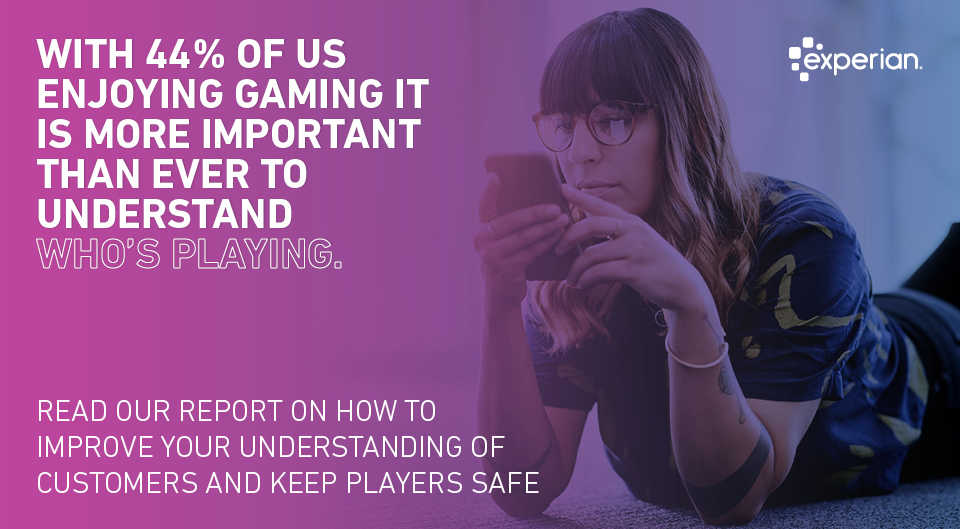Ready yourself – A 5-step guide to improving your understanding of a player’s financial vulnerability in readiness for regulatory change
The Information Commissioners Office (ICO) has announced that GDPR does not prevent gaming firms using credit bureau data to inform their understanding of a player’s financial risk.
In association with this, the Gambling Commission (GC) has proposed spending limits should be used as triggers for making vulnerability checks on players. The data being proposed to make these checks includes public information such as CCJs and bankruptcies, as well as more insightful credit and current account turnover data collected by credit bureau.
Financial institutions have been using these data for many years as trusted sources of information to inform someone’s financial well-being when applying for a loan.
The Gambling Commission is now consulting on these proposals in its review of Licensing Conditions and Code of Practice, which concludes at the end of October.
The results of this consultation may call on gaming firms to adopt credit bureau data as part of their everyday operations to protect players from harm.
80% of players may never be subject to these checks, but that still leaves another 20% that may require support to avoid them getting into financial difficulty. With an estimated 2.2 or million or 4.5% UK players at-risk*, firms need look at how they can prevent customers crossing the line from fun to addiction and financial distress.
The growth in online gaming has accelerated the need for Gaming firms to be vigilant and deliver on a commitment to keep players safe.
Getting yourself prepared for regulatory change?
In anticipation of new regulation on the use of CRA data, Gaming Operators need get prepared for change.
Here are the 5 key steps we think you should take to get ahead.
Step 1 – Get closer to the data.
Credit bureau information provides Gaming Operators with access to a wealth of new and insightful data on a player’s financial well-being.
Unlike previous information, this insight is personalised to the individual. It removes the need to use models or postcode averages of player income to estimate their finances. Available for more than 90% of UK consumers it sets a new benchmark for personalised insight on player’s capacity to gamble.
Data such as Count Court Judgements (CCJs), bankruptcy notices or IVAs (debt agreements) are publicly available from a credit bureau. Other information such as credit and summarised current account information are exclusive to bureaux.
Other measures being proposed include indicators of social deprivation that might further highlight potential vulnerability, and Experian has pioneered access to digital payroll to verify an individual’s employment and source of income – a valuable additional check on player’s identity.
It’s important to take time to understand the data, the insight and value it provides. Experian’s data consultants are here to help you get to grips with the data, to help you understand how best to deploy this insight to support your business.
We’re also looking at ways of packaging this information so it’s easy to implement to ensure we only share the information you need to make a decision.
Step 2 – Test and understand the impact of CRA data on your business.
Understanding the impact of this data on player’s and your business is critical to informing how best operationalise its use, so you can manage an online gaming experience appropriately.
The data can be used to inform your engagement with the Regulator, enabling you to evidence and audit to impact of financial vulnerability on your business and your commitment to delivering socially responsible gaming.
Key questions to consider are.
How many of your customers will require you to use public information versus more detailed credit and current account data to confirm their vulnerability?
How do measures of social deprivation and other data complement your understanding of player vulnerability. What additional value do these complementary data provide in verifying identity, or a player’s source and frequency of income?
Cross-matching these data to the number of accounts a player has and their spend can help you understand the full extent of their financial exposure.
Engaging now with Experian, means you can start your analysis and get prepared for any forthcoming regulation.
Matching bureau data to a sample of your player data allows you to create a personalised financial risk report tailored to your business that can help you understand the impact of impending regulation.
Step 3 – Find out how best to integrate operationalise bureau data.
CRA data is used every day by the UK’s biggest lenders to assess a person’s affordability for credit.
This is shared using ‘bank-grade’ infrastructure which is robust, secure and optimised for speed and simplicity. Data is provided through Application Programming Interfaces (APIs) which makes it easy and cost effective to implement.
However, much of this information is new to the Gaming industry, and the ICO has made several important recommendations:
Data minimisation – when assessing vulnerability, firms need to limit the data they use to only what is necessary. Thought needs to be given as to which data provides the most insight to inform a decision on player spend.
Manual review – firms are required to manually review CRA data before deciding on a player’s financial vulnerability. Making automated decisions from the data is not an option. How you manually review CRA data needs to be considered as part of operationalising its use.
Managing existing customers –. The Gambling Commission is consulting on the use of CRA data predominantly to manage existing customers. Other data such as public information, digital payslips or Open Banking may be used to help with onboarding new customers.
Real-time access to Bureau data is frictionless, non-intrusive and can be processed in the ‘back-office’ to minimise disruption and provide the right balance that can keep players safe without compromising their enjoyment.
Financial information on over 90% of UK consumers enables Experian to accurately validate, de-duplicate and pin a customer’s identity to create an Enhanced Single Customer View. This will help an Operator to get a complete view of a player’s spend where they have several accounts, to validate their level of expenditure, and identify vulnerability.
Gaming Operators need to do the groundwork now to understand how CRA data can plug-into their online systems to operationalise vulnerability checks.
Step 4 – Get compliance ready.
The ICO has made it clear that any use of data from credit bureaus must be transparent to players.
Operators should start reviewing their current transparency arrangements such as privacy notices and website notices to see where improvements and enhancements need to be made. Clear and prominent signposting to the potential use of credit bureau information when a player is playing online is likely to be needed and operators should start thinking about what changes and improvements, they need to make to achieve transparency for players. .
It’s worth remembering to sign post with players that use of CRA data to make a vulnerability check does not affect their credit score.
Step 5 – Keep on top of changes in a player’s financial well being.
Bureau data is updated monthly. This means it can keep pace with changes in consumer’s credit and current account behaviour to accurately inform their financial status. Real-time access afforded by a credit bureau means you can see this data at any point in time allowing you to understand the impact on your business as player behaviour changes.
This means you can identify and keep on top of emerging risk, so that you can respond and limit any potential harm, and evidence back to the Regulator your commitment to protect vulnerable customers.
To find out more about how we can help you DOWNLOAD OUR GUIDE TO GAMING or order your personalised financial risk analysis report, from our specialist Gaming Consultants.
E: ryan.holland@experian.com
*Source: Gambling Commission and Dept of Media Culture & Sport, High Stakes: Gambling Reform for the Digital Age Report, April 2023





